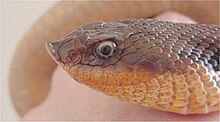Heterodon
| Heterodon | |
|---|---|
 |
|
| Eastern hog-nosed snake, H. platirhinos | |
| Scientific classification | |
| Kingdom: | Animalia |
| Phylum: | Chordata |
| Class: | Reptilia |
| Order: | Squamata |
| Suborder: | Serpentes |
| Family: | Dipsadidae |
| Subfamily: | Heterodontinae |
| Genus: |
Heterodon Latreille in Sonnini & Latreille, 1801 |
| Synonyms | |
|
Boa, Coluber, Natrix, Oxyrhina, Pelias, Scytale, Scytalus, Vipera |
|
Boa, Coluber, Natrix, Oxyrhina, Pelias, Scytale, Scytalus, Vipera
Heterodon is a genus of harmless colubrid snakes endemic to North America. They are stout with upturned snouts and are perhaps best known for their characteristic threat displays. Three species are currently recognized. Members of the genus are commonly known as hog-nosed snakes,North American hog-nosed snakes, and sometimes puff adders (though they should not be confused with the venomous African vipers of the genus Bitis).
Adults grow to 30–120 cm (12–47 in) in total length. The body is stout and the head is slightly distinct from the neck. The latter is expandable, the anterior ribs being capable of spreading to flatten that portion of the body, similar to a cobra. The tail is short and the anal scale divided. The dorsal scales are keeled with apical pits in 23-25 rows. The rostral scale is projecting, upturned, recurved and keeled dorsally. There are usually 1-20 accessory scales (azygous) that separate the internasals and the prefrontals. A subocular ring is present with 8-12 ocular scales. There are 7-8 upper labials and 9-13 lower labials. The ventrals number 114-152 and the subcaudals 27-60.
The color pattern is extremely variable. H. nasicus tends to be sandy-colored with black and white markings, while H. platirhinos varies from reds, greens, oranges, browns, to black depending on locality. They are sometimes blotched and sometimes solid-colored.
...
Wikipedia
